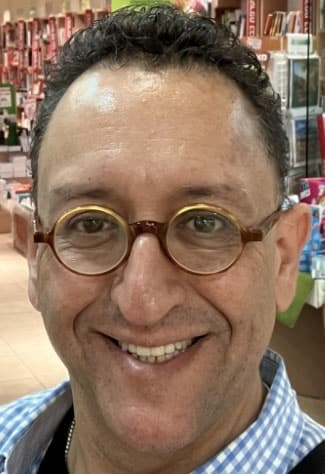“We must keep in touch,” Amos Oz said during my first meeting with him three years ago.
“With great pleasure,” I answered, proceeding to ask him today’s natural follow-up question: “What is your e-mail address?”
He looked at me with his charming smile and responded: “I don’t have an e-mail.”
Amos Oz, Israel’s best-known and most translated author, has penned 33 books — including novels, novellas and short stories — along with more than 400 articles on literature and Israeli politics. I use the word “penned,” because this gifted writer and outspoken political commentator accomplished this impressive literary output the old-fashioned way — with pen and paper. Actually, with two different pens — one blue, the other black.
“They each have a special purpose,” he once told me. “One is to rage against the government and tell them to go to hell, and the other is to tell stories.”
On May 4, Oz will turn 70. As part of the celebrations, a new English-language anthology, “The Amos Oz Reader”(Harcourt), was just released, offering a retrospective of some of the author’s finest writing from both his pens.
It is a refreshing departure from the stereotypical out-of-context compilation, and credit for this goes to editor Nitza Ben-Dov, a professor of Hebrew and comparative literature at Haifa University. Ben-Dov has creatively grouped Oz’s writings into four different themes: The Kibbutz, Jerusalem, the “Promised Land,” and some of Oz’s personal reflections, “In an Autobiographical Vein.” In so doing she gives us a bird’s-eye view of his life through the lenses of his writing.
Born May 4, 1939, in the Kerem Avraham neighborhood of Jerusalem, Amos Klausner grew up an only child in war-torn British Mandate Jerusalem during the years immediately leading up to the establishment of the State of Israel. His father, Yehuda Aryeh Klausner, was an intellectual whose politics were right-wing Revisionist Zionism. His mother, Fania Mussman, also an intellectual, suffered from severe depression. Their tiny Jerusalem apartment was filled with thousands of books, and Amos grew up in a milieu that included weekly Shabbat afternoon visits with his great uncle, professor Joseph Klausner, and often with Klausner’s neighbor and arch rival, the great writer S.Y. Agnon.
In 1952, Amos’s mother committed suicide at the age of 38. Two years later, just 14 1/2 years old, Amos Klausner left Jerusalem for Kibbutz Hulda, leaving behind his father and his family name, renaming himself “Oz” (which means “strength”), and rejecting his father’s Revisionist Zionism in favor of left-wing, Socialist Zionism. This biography continues to shape and inform much of Oz’s writings.
The “Kibbutz” section of the anthology features an excerpt from his first novel, “Elsewhere, Perhaps” (1966), where he explores the complex fine line between personal and communal life on the kibbutz, as well as the often-blurred line between kibbutz idealism and petty human behavior typical of any society.
Oz’s most famous novel, “My Michael” (1968), is the first exposure we have to his dark view of the city of his childhood, Jerusalem. The “Jerusalem” section includes a substantial excerpt from “My Michael,” titled “It’s Cold in This Jerusalem of Yours,” where the narrator, the depressed Hannah Gonen, describes the city as “a landscape pregnant with suppressed violence.”
One of Israel’s most vocal political journalists and peace activists, Oz’s other pen is well represented in the “Promised Land” section of the anthology, in which we encounter Oz’s liberal Zionism, his understandings of the terms “Jewish” and “Zionist,” his disdain for right-wing extremism and his vision of what Israel potentially can be. The section “In An Autobiographical Vein” features a chapter from “A Tale of Love and Darkness,” titled “My Mother Was Thirty-eight When She Died.” In 2003, Oz openly confronted the most traumatic event of his childhood, the suicide of his mother. With the publication of the quasi-memoir, quasi-autobiographical “A Tale of Love and Darkness,” readers were finally able to journey with Oz through the trauma and pain of his loss.
As Amos Oz celebrates his 70th birthday, the State of Israel celebrates its 61st year of independence. Oz recently said, “being an Israeli at 70 is like being an American who is 250 years old. I saw the Boston Tea Party and met both George Washington and Abraham Lincoln.”
While Oz’s analogy about his age is sharp and witty, it risks painting an inaccurate image of the Israel and the Israeli that he portrays in his books. The “George Washingtons and Abraham Lincolns” of Israel are not characters in Oz’s novels, and the “Boston Tea Parties” of Israel are at best the background to his plots. Amos Oz’s Israel is not the epic Israel and larger than life Israeli one finds in Leon Uris’s “Exodus” or Herman Wouk’s “The Hope.” Instead, he presents his readers with portraits of small, everyday people in provincial places within Israel. In fact, almost half of Oz’s books are set in the one square mile of Kerem Avraham, the small Jerusalem neighborhood where he was born. And when we do meet Israel’s political leaders or confront the complex issues surrounding the establishment of Israel, Israel’s military campaigns, or the Israeli-Palestinian conflict — as expressed in Oz’s political essays — one finds an Israel void of apologetic government rhetoric or simplistic one-sided arguments.
A week after our first meeting, I opened my mailbox and found an “old school” air-mail envelope adorned with a red, white and blue border. Inside was a personal letter on plain white paper, written in black pen.
Even without e-mail, Amos and I have kept in touch ever since.
Daniel Bouskila is the rabbi of Sephardic Temple Tifereth Israel. You can read his blog at rabbidanielbouskila.blogspot.com.





















 More news and opinions than at a Shabbat dinner, right in your inbox.
More news and opinions than at a Shabbat dinner, right in your inbox.